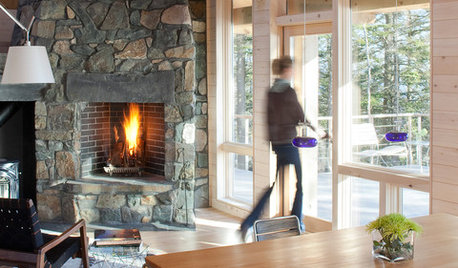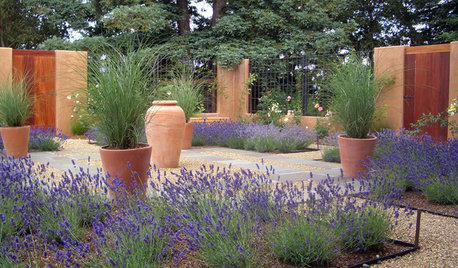Is Juniper (Texas Cedar) Ok For Mulching?
trudymom
15 years ago
Related Stories

GARDENING GUIDESNew Ways to Think About All That Mulch in the Garden
Before you go making a mountain out of a mulch hill, learn the facts about what your plants and soil really want
Full Story
GARDENING GUIDESHow to Pick a Mulch — and Why Your Soil Wants It
There's more to topdressing than shredded wood. Learn about mulch types, costs and design considerations here
Full Story
GARDENING GUIDESGarden Myths to Debunk as You Dig This Fall and Rest Over Winter
Termites hate wood mulch, don’t amend soil for trees, avoid gravel in planters — and more nuggets of garden wisdom
Full Story
WOODKnotty and Nice: Highly Textured Wood Has a Modern Revival
Whether it's cedar, fir or pine, if a wood has a knot, it's hot
Full Story
HOUZZ TOURSHouzz Tour: Up and Out Around a Heritage Tree
A Texas ranch house gets a modern makeover and a two-story addition that wraps around a protected backyard elm
Full Story
FARM YOUR YARDHow to Build a Raised Bed for Your Veggies and Plants
Whether you’re farming your parking strip or beautifying your backyard, a planting box you make yourself can come in mighty handy
Full Story
SAVING WATERXeriscape Gardens: How to Get a Beautiful Landscape With Less Water
Conserve water and make gardening much easier with the xeriscape approach’s 7 principles
Full Story
SAVING WATERHouzz Call: Are You Letting Go of Your Lawn?
Many facing a drought are swapping turf for less thirsty plantings. If you’re one of them, we’d like to hear about it
Full Story
BEFORE AND AFTERSSee 6 Yards Transformed by Losing Their Lawns
Wondering whether a turf lawn is the best use of your outdoor space? These homeowners did, and they found creative alternatives
Full Story
LANDSCAPE DESIGNGet Along With Less Lawn — Ideas to Save Water and Effort
Ditch the mower and lower your water bill while creating a feast for the eyes with diverse plantings and gathering places
Full Story





rhizo_1 (North AL) zone 7
Kimmsr
Related Professionals
Maple Valley Landscape Architects & Landscape Designers · Pelham Landscape Contractors · Stoughton Landscape Contractors · Arden-Arcade Landscape Contractors · Coram Landscape Contractors · Dinuba Landscape Contractors · Fair Oaks Landscape Contractors · Framingham Landscape Contractors · Gurnee Landscape Contractors · Indio Landscape Contractors · Siloam Springs Landscape Contractors · Tuscaloosa Landscape Contractors · Ansonia Landscape Contractors · Lenexa Decks, Patios & Outdoor Enclosures · New Berlin Decks, Patios & Outdoor Enclosurestsugajunkie z5 SE WI ♱
tsugajunkie z5 SE WI ♱
gardengal48 (PNW Z8/9)
tsugajunkie z5 SE WI ♱
tsugajunkie z5 SE WI ♱
gardengal48 (PNW Z8/9)
dchall_san_antonio